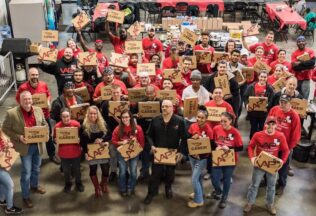Custom Woodworking Company Scales Up with MRP Software
Covenant Millwork, a custom woodworking company from Louisville, Georgia, needed software to support scaling up the operation. “There’s nothing really that works like MRPeasy,” says Kent Holdeman, President.

You can also listen to this article:
A woodworking company with two divisions
Covenant Millwork is a custom woodworking company from Louisville, Georgia that manufactures hardwood flooring, cabinetry, and furniture. The operation consists of two divisions, one of which specializes in flooring and components such as stair treads, shutters, and doors; the other focuses on cabinetry and furniture. Founded in 2006, the company is selling their products all over the United States, having expanded beyond the expectations of founders Kent Holdeman and Ron Shultz.
“We do custom work to meet quite unique requirements,” says Holdeman, who runs the flooring and millwork division. “For example, right now, I’m making a front door to match a 200-year-old home.”
Using a one-person data management system
Until 2020, his side of the company had 3-4 employees, and Holdeman could keep track of everything himself. When anyone had a question, they would run to him for information.
“With 3 people, that was okay,” he says.
In 2020, however, the company added a new line of flooring which also meant hiring more people. Holdeman’s one-person business management system started to buckle under this new weight and he decided to hire a consultant to figure out a solution. The consultant told him to either hire someone that could manage their business data in Excel, or implement a specialized software package.
“I needed software that would answer the questions from the shop floor workers without me having to work 80 hours per week trying to stay ahead of them,” Holdeman says.
The opening of the new product line coincided with the start of the COVID-19 lockdowns. People suddenly had much more free time to spend at home, which created a home renovations boom. Likewise, Covenant Millworks’ business had a significant uptick. This all created a perfect storm that Holdeman had a tough time navigating.
And so, Holdeman started looking for software. Having limited prior experience with business management systems, he was treading unknown territory.
“I didn’t even know what MRP or ERP stood for,” he states. “But eventually I realized that was just what I needed.”
Finding a software solution with endless possibilities
Holdeman scoured the internet for solutions, reading reviews and spending time trialing 5-6 different systems. He would create an account and build a job or two for initial assessment but realized that most solutions were just glorified spreadsheets.
“When I finally found MRPeasy, it took me a bit longer to get a job in but I realized that the possibilities were endless with this software,” he notes. “It also struck me as very user-friendly.”
Holdeman also liked that there was plenty of documentation available. He especially enjoyed the demo videos that explained various modules and functionalities of the system. All of this, along with a lengthy free trial, was freely accessible on the MRPeasy website.
What Holdeman appreciated the most was production scheduling functionality that enabled him to move things around easily. For example, if a job was delayed, he could just drag-and-drop it to the next day or next week with the rest of the calendar updating automatically. Likewise, if a job consisted of several processes and he moved one of the operations, the others would be automatically rescheduled as well.
“I found all that in MRPeasy,” he says.
Solo implementation required patience
Holdeman first started using the system just to keep track of his own work and then gradually gave access to other employees. Although the implementation was a daunting process, he persevered and managed to set up the system all by himself. Today, most of the company uses the software on a day-to-day basis.
“I want everybody to be able to log in and put in data,” Holdeman maintains.
No change comes without a bit of resistance, though. According to Holdeman, some employees were quite skeptical of the new way of doing things and it took a few months for everyone to buy in.
Reducing the managerial workload and improving inventory accuracy
Holdeman has made team building a central tenet of the growing company. Creating trust and accountability within the company allows him to step back and not micromanage every step of the operation. And MRPeasy has an important part in this, he says.
“Within six months of implementing the program, I started getting some really good feedback from the employees,” he remarks. “They can now work much more independently than they used to and they see the bigger picture better now.”
In addition to reducing the managerial workload for Holdeman, the new software has brought numerous benefits to Covenant Millworks. At a company where inventory management used to be practically non-existent and supplies were ordered somewhat randomly, the new system has introduced accurate material tracking. This helps Holdeman and the team avoid stockouts of materials critical to their manufacturing process. MRPeasy has also significantly improved the company’s lead time estimation accuracy.
“When I put in a customer order,” Holdeman details, “I can confidently give the customer a date when the order will be ready while instantly knowing what materials I need to fulfill the order.”
Getting a complete overview of the operation
Holdeman now also has a convenient overview of all his customer orders: which ones are waiting for production and which ones are ready for delivery, which ones are on time or late. When customer orders are confirmed, they can instantly be converted into manufacturing orders and scheduled automatically. The materials required to fulfill the order can be booked with a few clicks and if any of the materials are out of stock, a pre-filled purchase order is generated for the missing goods. In addition, the multi-site inventory management functionality of MRPeasy is instrumental as they operate in two separate locations.
“Now I know exactly what is in the warehouse and what is in the factory,” Holdeman says.
The team also uses MRPeasy to manage and track quality inspections and is in the process of setting up the maintenance management functionality that schedules maintenance for workstations based on days passed or hours operated. A less common but nevertheless important functionality that Covenant Millworks uses is the co-product bill of materials. This allows them to determine the byproducts created in making a product and enables workers to report the byproduct quantities created during production.
“For example, if we’re making a rustic floor and part of the raw material doesn’t match the look we’re going for, we can exclude that part within the system and send it back to stock,” Holdeman says. “This helps us keep better track of inventory, it’s a really neat feature.”
Recommendation to other manufacturers
To other growing manufacturers that are looking to adopt a production management system, Holdeman recommends facing the challenges of implementation head-on.
“There were moments during the setup of the software when I had to step outside and take a walk in the woods next to our facility to calm my nerves,” he recalls. “But now that the software does what we want it to do, it really pays off.”
As a final remark, Holdeman says: “And if you’re already comparing products, there’s nothing really that works like MRPeasy.”
You may also like: Custom Packaging Manufacturer Grows by 40% in 10 Months




